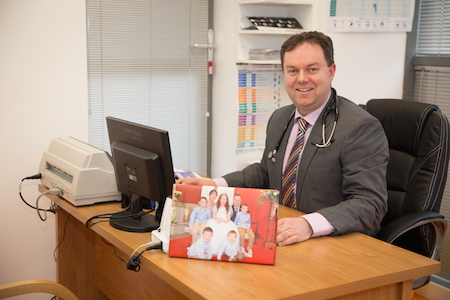This week Dr Roarty of Scally McDaid Roarty Medical Practice discusses a common women’s health issue.
Polycystic Ovarian Syndrome or PCOS as it is commonly known as, is quite a common condition and is thought to occur in about one in ten women.
It is a condition where a woman has at least two (and often three) of the following :
- Many tiny cysts on her ovaries – usually more than 12.
- An imbalance of hormones , in particular testosterone.
- Altered ovulation – ovulation may not occur every month. If a woman does not ovulate she may not have a period.
What are the symptoms?
Usually symptoms will become noticeable in a woman’s late teens or early twenties. Not all symptoms will occur in every woman. They can be quite mild or really severe. They can also vary depending on your age.
Periods can become irregular, light or even disappear. PCOS can lead to fertility problems as ovulation is needed to become pregnant. Excessive hair-growth is a well-known symptom of PCOS, though it doesn’t happen in every case. The difference between mild unwanted hair growth which is quite common and considered normal and excessive abnormal hair-growth can be difficult to distinguish. The excessive hair-growth tends to be male pattern ie facial chest and tummy. Acne can persist well after the teenage years and male pattern hair loss may occur on the scalp. Weight gain is more common in women with PCOS as is depression, probably because of the other symptoms.
Do we know what causes PCOS?
The cause is not entirely clear. However, we do know a number of factors that are involved. Women with PCOS tend to have insulin resistance, that is more insulin is required to keep blood sugar levels normal. This then leads to ovaries producing too much testosterone, which in turn causes problems with ovulation and thus fertility. Insulin resistance contributes to weight gain and it will come as no surprise to learn that excessive testosterone contributes to excessive hair growth.
High levels of a specific hormone produced in the brain called LH is common in PCOS patients and this higher level of LH contributes to excessive testosterone.
PCOS is not directly inherited but there seems to be a hereditary component to the condition in some cases. Excessive weight also seems to make the level of insulin resistance worse.
Are there any other problems with PCOS?
PCOS will increase your chances of developing a number of other conditions eg raised blood pressure, Type 2 Diabetes, high cholesterol, gestational diabetes (diabetes in pregnancy) and weight gain. All of these will then increase your risk of cardiovascular problems (eg stroke, heart attack). Pre-eclampsia, a condition where the blood pressure is raised during pregnancy is also more common in cases of PCOS.
What tests are needed?
A blood test will check for hormonal imbalances if PCOS is suspected while an ultrasound scan can check for the multiple tiny cysts that may develop on the ovary.
Is there a cure?
There is no cure. Weight loss will be advised as this reduces the raised insulin levels (and subsequently the raised testosterone levels) and thus chances of ovulation, regular periods and fertility. It may also help with acne and hairgrowth. A dietician’s advice can be helpful here. There are various ways of dealing with excessive hairgrowth such as creams, electrolysis, and laser treatments. Certain oral contraceptive pills can also help with excessive hairgrowth and if these all fail, a specialist may prescribe particular anti-testosterone medicines. Acne is treated using the usual treatments and period problems are often managed using contraceptives.
Fertility issues are treated with medicines usually prescribed by a specialist. Medicines which are normally used to treat Diabetes are sometimes prescribed ( to decrease the blood level of insulin) by a specialist also, though further research is required to confirm their role. A healthy lifestyle is important for everyone but particularly for a woman with PCOS so that she does not develop any long-term complications, and so, your doctor will usually discuss a healthy diet, regular exercise, weight loss if needed and smoking.
The above information is intended as advice only and should you have any concerns please contact your own Doctor.
Dr Ciarán Roarty MB, BCh BAO MICGP DRCOG Grad. Cert. Obst. Ultrasound
is a full-time GP at Scally McDaid Roarty Medical Practice, Scally Place, Letterkenny, Tel 0749164111 www.scallys.ie
Tags:









